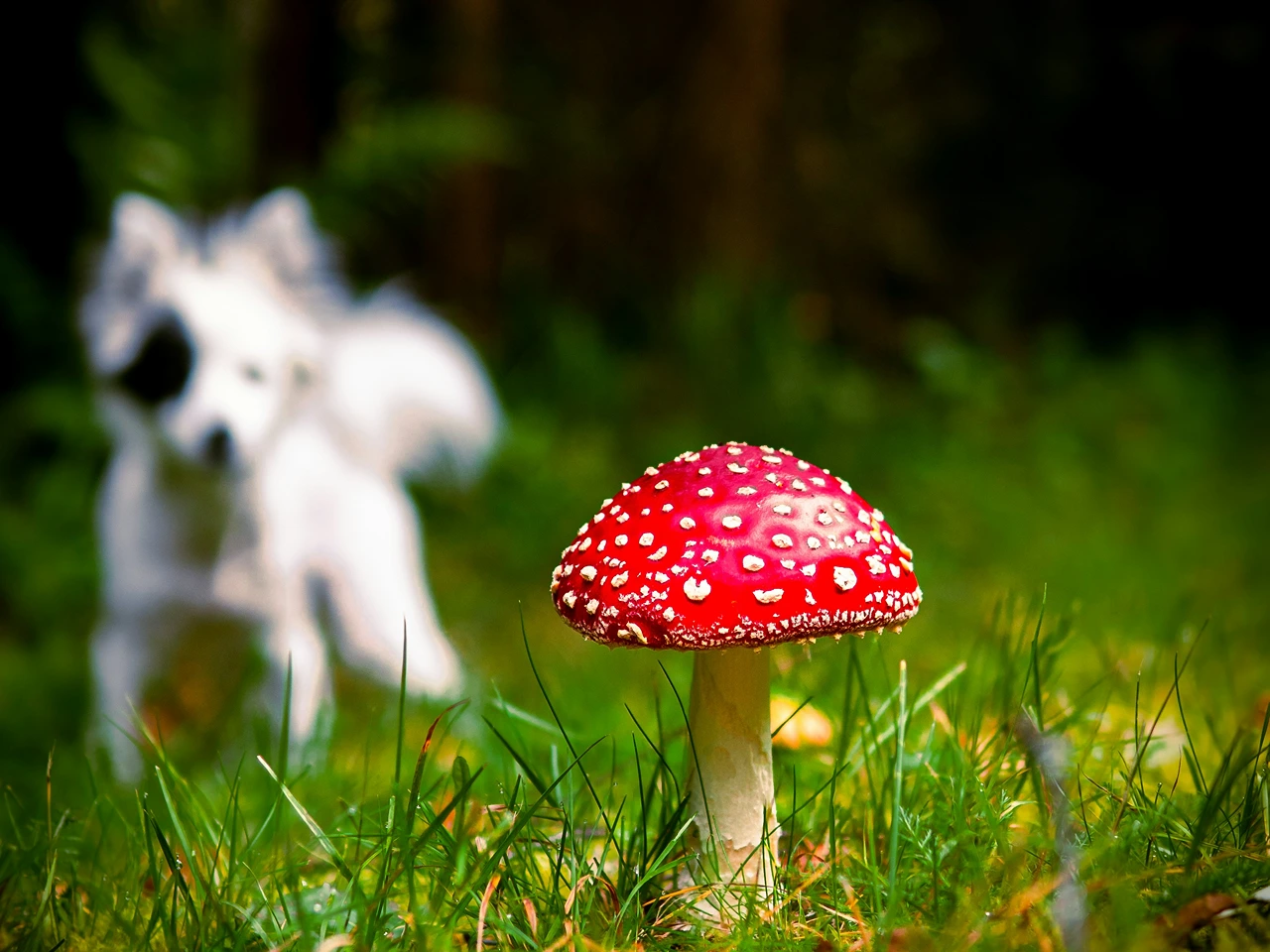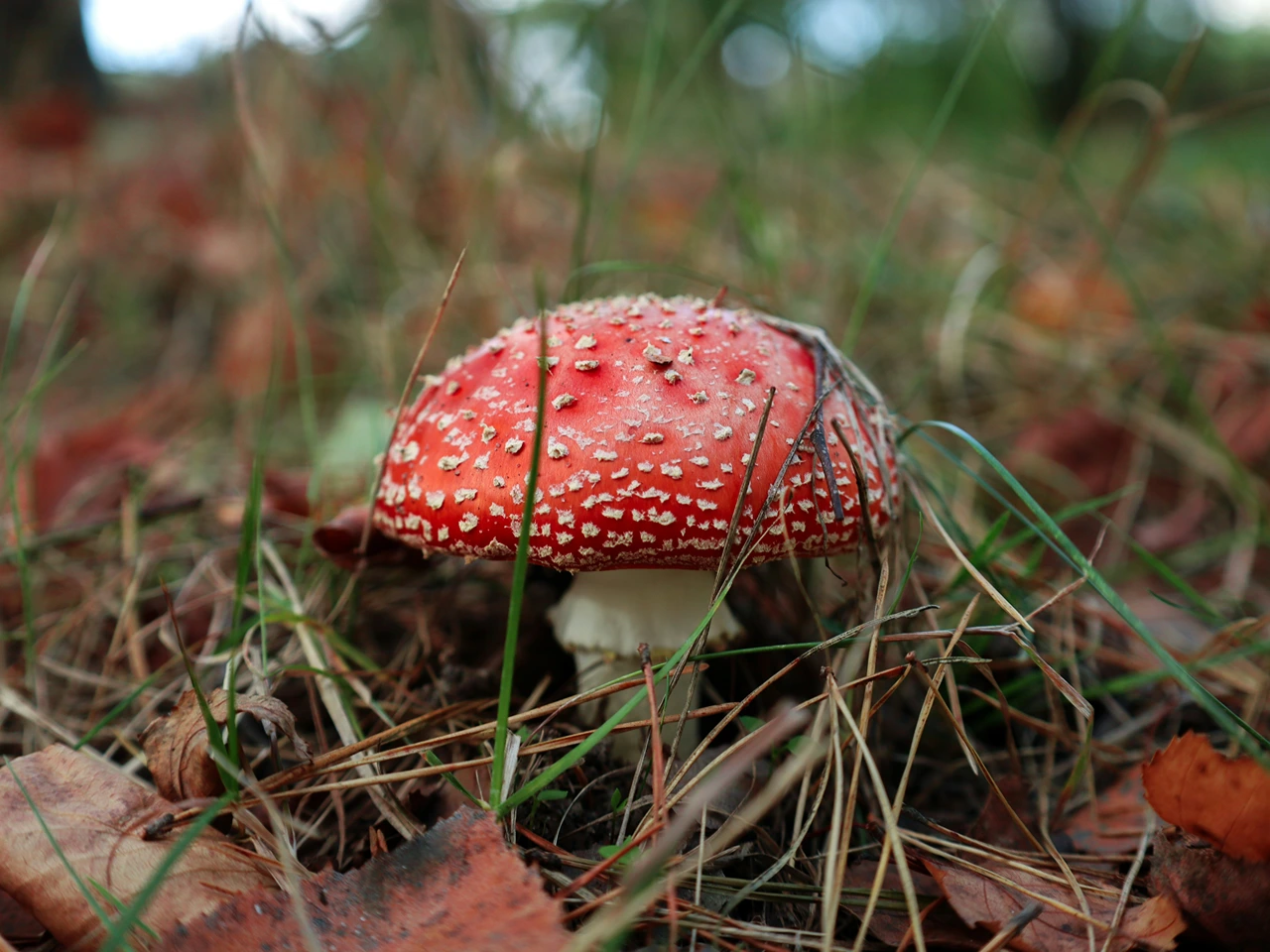TL;DR – Can Dogs Eat Mushrooms?
- Safe vs. Toxic: Some mushrooms are safe for dogs, but many wild varieties are highly toxic and even deadly.
- Toxic mushrooms to avoid: Amanita (death cap), Galerina, False morels.
- Safe store-bought mushrooms (cooked, small amounts): White, Portobello, Cremini.
- Feeding Guidelines: Always cook and cut mushrooms into small pieces; start with tiny portions to check tolerance.
- Symptoms of mushroom poisoning: Vomiting, drooling, diarrhea, lethargy, tremors, seizures, liver damage.
- What to Do: If ingestion is suspected: remove the mushroom, collect a sample, and contact your vet immediately.
- Best rule: never feed wild mushrooms; stick to store-bought, cooked ones only.
Have questions? We’re happy to guide you on safe foods for your dog and help create a diet plan that supports their health.
Dogs are naturally curious animals, and their tendency to sniff, lick, and taste just about anything can sometimes get them into trouble. Mushrooms are one of those things that can easily catch a dog’s curiosity, whether they spot them in the yard, on a walk, or even in your kitchen. Some mushrooms are safe and can even be a healthy snack in small amounts, but many types, especially wild ones, can be very toxic and dangerous for your dog’s health.
Because it’s not always easy to tell the difference between safe and poisonous types, knowing the dangers and how to safely introduce mushrooms to your dog’s diet is an important responsibility for every pet owner.
Are Mushrooms Bad for Dogs?

Some mushrooms for dogs are safe, but many mushrooms are actually poisonous to dogs. If you suspect your dog has eaten a wild mushroom, watch closely for unusual symptoms and contact your vet immediately. Early intervention can make a big difference. Dogs love to explore, which means they might eat wild mushrooms just out of curiosity, sometimes with dangerous results.
Mushrooms grow in gardens, forests, lawns, and damp corners, making these areas where wild mushrooms appear easy for your dog to stumble into during walks. Dogs can also be attracted to the smell or texture of mushrooms, which makes it tempting for them to eat.
Certain mushroom species only grow during specific seasons, so knowing when they appear can help you keep your dog out of harm’s way. Even on a leash, dogs can sneak a bite if you’re not careful, and it’s important to never feed your dog wild mushrooms, no matter how harmless they look.
Varieties of Mushrooms That Are Toxic to Dogs

Many mushrooms are toxic to dogs, and knowing which kinds to avoid can be life-saving. These species of mushrooms can cause severe poisoning even with a small bite.
- Amanita species: Includes the deadly death cap mushrooms, which are among the most toxic mushrooms known to exist. Just a small amount can be fatal to dogs.
- Galerina species: Small brown mushrooms that may look harmless but are extremely poisonous and highly toxic to dogs.
- False morels: Recognizable by their wrinkled, irregular caps; these mushrooms are poisonous even in very small amounts.
Identifying mushrooms can be tricky because edible mushrooms often look very similar to toxic ones. Mushroom species also vary depending on your region, which makes local knowledge especially important when spotting wild mushrooms. Because of these risks, it’s best to assume that wild mushrooms are toxic and keep your dog away from them altogether.
Medicinal Mushrooms Good for Dogs

Some types of mushrooms do more than just add nutrition, they can actually support your dog’s health. These mushrooms for dogs are often used in holistic care, but it’s important to remember that both the mushroom and the amount play a big role in whether they’re safe and effective.
- Reishi mushrooms: Great for giving your dog’s immune system a little boost. Just a small amount is enough, and they’re often part of wellness supplements.
- Chaga mushrooms: Full of antioxidants and easy to use since they usually come in powder, just sprinkle a bit over their food.
- Maitake mushrooms: Can help support metabolism and immunity, as long as you stick to the right amount.
When it comes to medicinal mushrooms, the serving size matters. Too much can overwhelm your dog’s system, so always stick to small, measured doses based on your dog’s size. Dried mushrooms or powdered extracts are popular choices since they’re easier to store and can be mixed directly with dog food.
Note: Before introducing any of these mushrooms, check with your vet. Some dogs with existing health issues or on medication may need extra guidance to ensure mushrooms are a safe addition.
Store-Bought Mushrooms That Are Safe for Dogs

Some mushrooms you buy from the store are perfectly fine for dogs to eat. These are considered non-toxic mushrooms, and when served in the right way, they can be a safe and healthy option for your dog’s diet. Cooking them first makes them easier to digest and helps reduce the chance of stomach upset.
- White mushrooms: Mild in flavour and generally fine for dogs to eat in small, cooked portions.
- Portobello mushrooms: Known for their meaty texture, when cooked, they’re soft, flavourful, and easy for dogs to digest.
- Cremini mushrooms: Slightly stronger in taste than white mushrooms, but still considered non-toxic mushrooms when prepared properly.
Besides being safe, these mushrooms are rich in antioxidants, vitamins, and fibre. Their nutrients can help support your dog’s overall health, making mushrooms a healthy little boost when given in moderation.
You can mix some safe mushrooms into your dog’s meals or offer them as an occasional treat. Just make sure they’re store-bought and cooked, so your pup can enjoy them safely.
How to Feed Mushrooms to Your Dog
If you want to share mushrooms with your dog, do it carefully and in moderation. Following the right steps helps minimize any risks while letting your dog reap the benefits without upsetting their tummy.
- Always consider cooking mushrooms before serving. Cooked mushrooms are much easier for dogs to digest, while raw wild mushrooms should be avoided completely.
- Cut mushrooms into small, bite-sized pieces. Even safe mushrooms can become a choking hazard if served in chunks that are too large.
- For an easy way to add nutrition, mix safe, cooked mushrooms into your dog’s regular food. This helps enhance the meal without overwhelming your dog with a new flavour.
- Start slow. Offer just a tiny piece at first to see how your dog might react. This way you’ll know if mushrooms agree with their stomach.
- Keep servings small. While mushrooms can be healthy, too many mushrooms can cause mild digestive upset. Remember, mushrooms can also add calories, so moderation is key.
Symptoms of Mushroom Poisoning in Dogs

Mushroom poisoning in dogs can cause all sorts of health issues, and the reaction often depends on the kind of mushroom eaten and how much was ingested. Spotting the signs quickly can make all the difference.
Early warning signs
If your dog ate a mushroom that turned out to be toxic, you may notice symptoms such as vomiting, excessive drooling, or unusual lethargy within just a few hours. These are often the first red flags.
Digestive reactions
Upset stomach is one of the most common responses. Diarrhea, stomach cramps, and discomfort are typical if a dog eats a mushroom that doesn’t agree with them.
Neurological effects
Some poisonous mushrooms can impact the nervous system, leading to tremors, staggering or uncoordinated movements, and in severe cases, seizures.
Liver complications
Highly toxic species may target the liver, causing serious internal damage. This can progress quickly and often requires urgent veterinary treatment.
Behavioural changes
Confusion, restlessness, or sudden agitation may appear after exposure, signalling that your dog has eaten a poisonous mushroom and is having a strong reaction.
The faster you respond when a toxic mushroom is ingested, the better your dog’s chances of a safe recovery. Quick veterinary care is always the best step.
What to Do If Your Dog Ate a Poisonous Mushroom

When it comes to mushroom poisoning, quick action can save your dog’s life. If you think your dog has eaten a poisonous mushroom, try to stay calm, but don’t waste a second.
- Immediate actions: Remove any remaining mushrooms from your dog’s mouth or the area, and keep your dog calm to prevent further stress.
- Sample collection: If possible, collect a sample of the mushroom your dog ingested. This helps the veterinarian identify the species and decide on the right treatment.
- Veterinary documentation: Give your vet as much information as you can, including the type of mushroom ingested (if known) and the symptoms you’ve observed. This speeds up diagnosis and care.
- Treatment options: Depending on the species and how much was eaten, your vet may induce vomiting, administer activated charcoal to absorb toxins, or provide supportive therapies such as IV fluids and medications.
- Recovery monitoring: After treatment, watch your dog closely for changes in behaviour, appetite, or digestion. Even after initial recovery, follow-up care may be needed to ensure no hidden damage.
Final Thoughts
While dogs can eat mushrooms, it’s important to know which mushrooms are safe and which are highly poisonous to dogs. Stick to store-bought ones that are cooked, and steer clear of wild mushrooms, some of them are toxic. If your pup accidentally eats something suspicious, give your vet a call right away.
Safe mushrooms can be a tasty, healthy treat for your dog, but the wrong ones can be really dangerous. Keep your dog on a leash during walks, never let them nibble wild mushrooms, and stay alert. A little caution goes a long way in keeping your furry friend safe and happy!
Frequently Asked Questions
Can dogs eat mushrooms safely?
Yes, dogs can eat mushrooms in some cases, but not all types are safe.
Nutritional value: Some mushrooms contain vitamins, antioxidants, and fibre, making them beneficial in small amounts.
Toxic risk: Many mushrooms can be toxic, which means even a small bite could put your dog in danger.
Store-bought vs. wild: Mushrooms sold in grocery stores are typically safer than wild ones found outside.
Risk awareness: Because mushrooms are bad for dogs in certain cases, always introduce them with caution.
Observation: If you’re unsure about the mushroom your dog ate, contact your vet immediately for guidance.
Why shouldn’t my dog eat wild mushrooms?
Dogs should never eat wild mushrooms because their safety is unpredictable.
Identification issues: It’s often difficult to identify toxic mushrooms since many safe and dangerous varieties look alike.
Safety factor: While some are generally safe for dogs, wild mushrooms carry unpredictable risks.
Avoidance rule: If you’re not sure if they are safe for your dog, they should be avoided completely.
Prevention tip: If you suspect you’ve given your dog a wild mushroom, call your vet for guidance.
Safer option: When feeding mushrooms, it’s best to stick to well-cooked, store-bought types only.
Do mushrooms affect all dogs the same way?
No, mushrooms affect dogs differently depending on several factors.
Different reactions: Mushrooms can affect dogs differently depending on their size, age, and health.
Toxic impact: Some species are outright harmful to dogs, even if other pets show no issues.
Risk of poisoning: If your pet ingests a wild mushroom, the reaction may vary from mild to life-threatening.
Unpredictable results: Symptoms of mushroom poisoning depend on the mushroom type and amount eaten.
Caution reminder: Even mushrooms like white button or cremini should only be fed in moderation.
What kinds of mushrooms may be safe for dogs?
Some store-bought mushrooms may be safe for dogs when cooked and served plain.
Common types: Safe mushrooms may include store-bought varieties such as portobello, white, or cremini.
Pet-friendly tip: To find out if dogs enjoy them, introduce tiny amounts and observe reactions.
Sharing safely: If you want to share mushrooms with your dog, ensure they are cooked and unseasoned.
Health awareness: What you should know about whether mushrooms are safe is that moderation matters most.
Pet nutrition: Know that dogs can eat certain cooked mushrooms without risk when introduced carefully.
Are mushrooms often dangerous for dogs?
Yes, mushrooms are often risky for dogs, especially if they come from the wild.
General rule: Mushrooms are often harmless when prepared properly, but wild ones are unpredictable.
Danger factor: Because mushrooms may contain hidden toxins, even small bites can cause illness.
Safety guideline: If you ever find your dog sniffing wild fungi, keep them away to prevent accidental eating.
Quick response: Should poisoning occur, always bring details of the mushroom your dog ingested to the vet.
Final advice: Remember that when it comes to mushrooms, safety first—avoid risks and keep your pet healthy.




